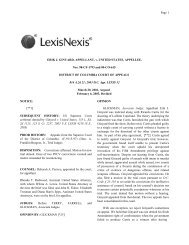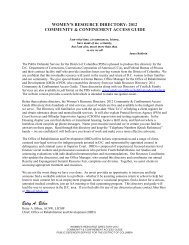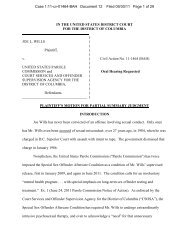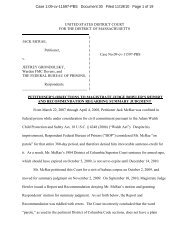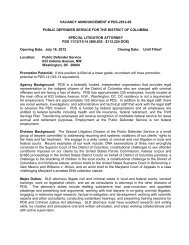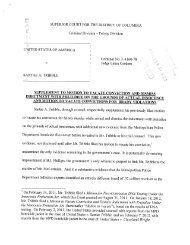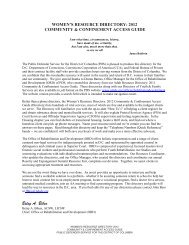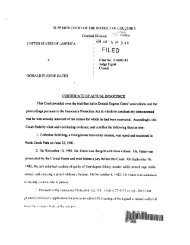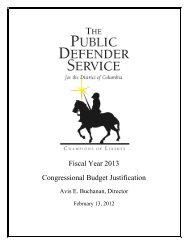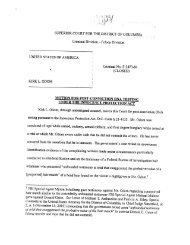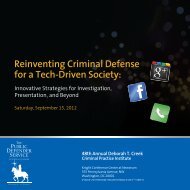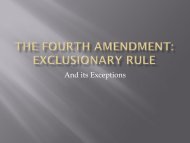Ohio v. Reiner - Public Defender Service
Ohio v. Reiner - Public Defender Service
Ohio v. Reiner - Public Defender Service
You also want an ePaper? Increase the reach of your titles
YUMPU automatically turns print PDFs into web optimized ePapers that Google loves.
Page 1<br />
OHIO v. MATTHEW REINER<br />
No. 00-1028<br />
SUPREME COURT OF THE UNITED STATES<br />
532 U.S. 17; 121 S. Ct. 1252; 149 L. Ed. 2d 158; 2001 U.S. LEXIS 2454; 69 U.S.L.W.<br />
3616; 55 Fed. R. Evid. Serv. (Callaghan) 1171; 2001 Daily Journal DAR 2769; 2001<br />
Colo. J. C.A.R. 1446; 14 Fla. L. Weekly Fed. S 129<br />
March 19, 2001, Decided<br />
PRIOR HISTORY: ON PETITION FOR WRIT OF<br />
CERTIORARI TO THE SUPREME COURT OF OHIO.<br />
DECISION:<br />
Witness who denied all culpability in manslaughter<br />
trial held to have valid privilege against<br />
self-incrimination under Federal Constitution's Fifth<br />
Amendment, where witness had reasonable cause to<br />
apprehend danger from her answers if questioned at trial.<br />
SUMMARY:<br />
A father whose child had died of "shaken baby"<br />
syndrome was tried in the Lucas County Court of<br />
Common Pleas, an <strong>Ohio</strong> trial court, for involuntary<br />
manslaughter. The father's defense was that the child's<br />
babysitter was guilty. The babysitter informed the court<br />
in advance of testifying that she intended to assert her<br />
privilege against self-incrimination under the Federal<br />
Constitution's Fifth Amendment. The trial court granted<br />
her transactional immunity from prosecution and the<br />
witness testified that she had had no involvement with the<br />
death of the child. The father was found guilty of<br />
involuntary manslaughter at the trial. The conviction was<br />
reversed on other grounds in the Court of Appeals of<br />
<strong>Ohio</strong>. Subsequently, the Supreme Court of <strong>Ohio</strong> affirmed<br />
the reversal of the father's manslaughter conviction on the<br />
alternative grounds that the witness had no valid Fifth<br />
Amendment privilege and that the trial court's grant of<br />
immunity was therefore invalid (89 <strong>Ohio</strong> St 3d 342, 2000<br />
<strong>Ohio</strong> 190, 731 NE2d 662).<br />
Granting certiorari, the United States Supreme Court<br />
reversed the judgment of the Supreme Court of <strong>Ohio</strong> and<br />
remanded the case for further proceedings. In a per<br />
curiam opinion expressing the unanimous view of the<br />
court, it was held that the witness' assertion of innocence<br />
did not by itself preclude her invocation of the privilege<br />
against self-incrimination, for the witness had reasonable<br />
cause to apprehend danger from her answers if<br />
questioned at the involuntary manslaughter trial.<br />
LAWYERS' EDITION HEADNOTES:<br />
[***LEdHN1]<br />
APPEAL §910.6<br />
WITNESSES §81<br />
-- privilege against self incrimination -- grant of<br />
certiorari<br />
Headnote:[1A][1B]<br />
In a case where a witness in an involuntary<br />
manslaughter trial--having been granted transactional<br />
immunity after informing a state trial court that she<br />
intended to invoke the privilege against self-incrimination
532 U.S. 17, *; 121 S. Ct. 1252, **;<br />
149 L. Ed. 2d 158, ***LEdHN1; 2001 U.S. LEXIS 2454<br />
Page 2<br />
under the Federal Constitution's Fifth<br />
Amendment--testified that she had no involvement with<br />
the death of the alleged victim, the United States<br />
Supreme Court will grant the state's petition for certiorari,<br />
will reverse a judgment of the state's highest court which<br />
held that the witness had no Fifth Amendment privilege,<br />
and will remand the case for further proceedings, where<br />
(1) the defense's theory of the case was that the witness,<br />
rather than the defendant, was responsible for the alleged<br />
victim's death, and (2) in this setting, the witness had a<br />
valid Fifth Amendment privilege, for she had reasonable<br />
cause to apprehend danger from her answers if<br />
questioned at trial.<br />
[***LEdHN2]<br />
APPEAL §487<br />
-- Supreme Court review -- state court decision<br />
Headnote:[2]<br />
The United States Supreme Court has jurisdiction<br />
over a state court's judgment that rests, as a threshold<br />
matter, on a determination of federal law; thus, the<br />
Supreme Court has jurisdiction over a judgment of a<br />
state's highest court which held that a state trial witness<br />
who denied all guilt was not entitled to the privilege<br />
against self-incrimination under the Federal<br />
Constitution's Fifth Amendment--and had thus been<br />
wrongly granted immunity--where (1) the decision at<br />
issue fairly appears to be interwoven with federal law,<br />
and (2) no adequate and independent state ground is clear<br />
from the face of the opinion.<br />
[***LEdHN3]<br />
WITNESSES §72<br />
-- self-incrimination -- extent of privilege<br />
Headnote:[3]<br />
The privilege against self-incrimination under the<br />
Federal Constitution's Fifth Amendment extends not only<br />
to answers that would in themselves support a conviction,<br />
but likewise embraces those which would furnish a link<br />
in the chain of evidence needed to prosecute the claimant;<br />
it need only be evident from the implications of the<br />
question, in the setting in which the question is asked,<br />
that a responsive answer to the question--or an<br />
explanation of why the question cannot be<br />
answered--might be dangerous because injurious<br />
disclosure could result.<br />
[***LEdHN4]<br />
WITNESSES §78<br />
-- decision as to incriminating nature of evidence<br />
Headnote:[4]<br />
It is for a court to inquire whether a witness has<br />
reasonable cause to apprehend danger from a direct<br />
answer so as to be entitled to the protection of the<br />
privilege against self-incrimination under the Federal<br />
Constitution's Fifth Amendment, because (1) the witness'<br />
assertion does not by itself establish the risk of<br />
incrimination, and (2) a danger of imaginary and<br />
unsubstantial character will not suffice.<br />
OPINION<br />
[**1253] [***160] [*18] PER CURIAM.<br />
[***LEdHR1A] [1A]The Supreme Court of <strong>Ohio</strong><br />
here held that a witness who denies all culpability does<br />
not have a valid Fifth Amendment privilege against<br />
self-incrimination. Because our precedents dictate that<br />
the privilege protects the innocent as well as the guilty,<br />
and that the facts here are sufficient to sustain a claim of<br />
privilege, we grant the petition for certiorari and reverse.<br />
Respondent was charged with involuntary<br />
manslaughter in connection with the death of his<br />
2-month-old son Alex. The coroner testified at trial that<br />
Alex died from "shaken baby syndrome," the result of<br />
child abuse. He estimated that Alex's injury most likely<br />
occurred minutes before the child stopped breathing.<br />
Alex died two days later when he was removed from life<br />
support. Evidence produced at trial revealed that Alex<br />
had a broken rib and a broken leg at the time of his death.<br />
His twin brother Derek, who was also examined, had<br />
several broken ribs. Respondent had been alone with<br />
Alex for half an hour immediately before Alex stopped<br />
breathing. Respondent's experts testified that Alex could<br />
have been injured several hours before his respiratory<br />
arrest. Alex was in the care of the family's babysitter,<br />
Susan Batt, at that time. Batt had cared for the children<br />
during the day for about two weeks prior [***161] to<br />
Alex's death. The defense theory was that Batt, not<br />
respondent, was the culpable party.
532 U.S. 17, *18; 121 S. Ct. 1252, **1253;<br />
149 L. Ed. 2d 158, ***161; 2001 U.S. LEXIS 2454<br />
Page 3<br />
Batt informed the court in advance of testifying that<br />
she intended to assert her Fifth Amendment privilege. At<br />
the State's request, the trial court granted her transactional<br />
immunity from prosecution pursuant to <strong>Ohio</strong> Rev. Code<br />
Ann. § 2945.44 (1999). She then testified to the jury that<br />
she had refused to testify without a grant of immunity on<br />
the advice of counsel, although she had done nothing<br />
wrong. Batt denied any involvement in Alex's death. She<br />
testified that she had never shaken Alex or his brother at<br />
any time, specifically on the day Alex suffered<br />
respiratory arrest. She said she [*19] was unaware of<br />
and had nothing to do with the other injuries to both<br />
children. The jury found respondent guilty of involuntary<br />
manslaughter, and he appealed.<br />
The Court of Appeals of <strong>Ohio</strong>, Sixth District,<br />
reversed respondent's conviction on grounds not relevant<br />
to our decision here. The Supreme Court of <strong>Ohio</strong><br />
affirmed the reversal, on the alternative ground that Batt<br />
had no valid Fifth Amendment privilege and that the trial<br />
court's grant of immunity under § 2945.44 was therefore<br />
unlawful. * 89 <strong>Ohio</strong> St. 3d 342, 358, 731 N.E.2d 662, 677<br />
(2000). The court found that the wrongful grant of<br />
immunity prejudiced respondent, because it effectively<br />
told the jury that Batt did not cause Alex's injuries.<br />
* <strong>Ohio</strong> Rev. Code Ann. § 2945.44 (1999) states<br />
in pertinent part: "In any criminal proceeding . . .<br />
if a witness refuses to answer or produce<br />
information on the basis of his privilege against<br />
self-incrimination, the court of common pleas . . .<br />
unless it finds that to do so would not further the<br />
administration of justice, shall compel the witness<br />
to answer or produce the information, if . . . [the<br />
prosecuting attorney so requests and] . . . the court<br />
. . . informs the witness that by answering, or<br />
producing the information he will receive<br />
[transactional] immunity . . . ." (Emphasis added.)<br />
The court recognized that the privilege against<br />
self-incrimination applies where a witness' answers<br />
"could reasonably 'furnish a link in the chain of<br />
evidence'" against him, 89 <strong>Ohio</strong> St. 3d at 352, 731 N.E.2d<br />
at 673, quoting Hoffman v. United States, 341 U.S. 479,<br />
486, 95 L. Ed. 1118, 71 S. Ct. 814 (1951). Hoffman, it<br />
noted, requires the trial court to determine whether the<br />
witness has correctly asserted the privilege, and to order<br />
the witness to answer questions if the witness is mistaken<br />
about the danger of incrimination. Ibid. The court faulted<br />
the trial judge for failing to question sufficiently Batt's<br />
assertion of the privilege. It noted that the Court of<br />
Appeals, in finding a valid privilege, failed to [**1254]<br />
consider the prosecutor's suggestion that Batt's testimony<br />
would not incriminate her, and Batt's denial of<br />
involvement in Alex's abuse when questioned by the<br />
Children's <strong>Service</strong>s Board. The court held that "Susan<br />
Batt's [*20] [trial] testimony did not incriminate her,<br />
because she denied any involvement in the abuse. Thus,<br />
she did not have a valid Fifth Amendment privilege." 89<br />
<strong>Ohio</strong> St. 3d at 355, 731 N.E.2d at 675 (emphasis in<br />
original). The court emphasized that the defense's theory<br />
of Batt's guilt was not grounds for a grant of immunity,<br />
"when the witness continues to deny any<br />
self-incriminating conduct." Ibid.<br />
[***LEdHR2] [2]The Supreme Court of <strong>Ohio</strong>'s decision<br />
that Batt was wrongly granted immunity under § 2945.44<br />
(and consequently, that reversal of respondent's<br />
conviction was required) rested on the court's<br />
determination [***162] that Batt did not have a valid<br />
Fifth Amendment privilege. In discussing the contours of<br />
that privilege, the court relied on our precedents. We<br />
have observed that "this Court retains a role when a state<br />
court's interpretation of state law has been influenced by<br />
an accompanying interpretation of federal law." Three<br />
Affiliated Tribes of Fort Berthold Reservation v. Wold<br />
Engineering, P. C., 467 U.S. 138, 152, 81 L. Ed. 2d 113,<br />
104 S. Ct. 2267 (1984). The decision at issue "fairly<br />
appears . . . to be interwoven with federal law," and no<br />
adequate and independent state ground is clear from the<br />
face of the opinion. Michigan v. Long, 463 U.S. 1032,<br />
1040-1041, 77 L. Ed. 2d 1201, 103 S. Ct. 3469 (1983).<br />
We have jurisdiction over a state-court judgment that<br />
rests, as a threshold matter, on a determination of federal<br />
law. See Merrell Dow Pharmaceuticals Inc. v.<br />
Thompson, 478 U.S. 804, 816, 92 L. Ed. 2d 650, 106 S.<br />
Ct. 3229 (1986) ("This Court retains power to review the<br />
decision of a federal issue in a state cause of action."); St.<br />
Louis, I. M. & S. R. Co. v. Taylor, 210 U.S. 281, 293-294,<br />
52 L. Ed. 1061, 28 S. Ct. 616 (1908).<br />
[***LEdHR3] [3]The Fifth Amendment provides that<br />
"no person . . . shall be compelled in any criminal case to<br />
be a witness against himself." U.S. Const., Amdt. 5. As<br />
the Supreme Court of <strong>Ohio</strong> acknowledged, this privilege<br />
extends not only "to answers that would in themselves<br />
support a conviction . . . but likewise embraces those<br />
which would furnish a link in the chain of evidence<br />
needed to prosecute the claimant." Hoffman, 341 U.S. at<br />
486. "It need only be evident from the [*21]
532 U.S. 17, *21; 121 S. Ct. 1252, **1254;<br />
149 L. Ed. 2d 158, ***LEdHR3; 2001 U.S. LEXIS 2454<br />
Page 4<br />
implications of the question, in the setting in which it is<br />
asked, that a responsive answer to the question or an<br />
explanation of why it cannot be answered might be<br />
dangerous because injurious disclosure could result." 341<br />
U.S. at 486-487.<br />
[***LEdHR4] [4]We have held that the privilege's<br />
protection extends only to witnesses who have<br />
"reasonable cause to apprehend danger from a direct<br />
answer." 341 U.S. at 486.That inquiry is for the court; the<br />
witness' assertion does not by itself establish the risk of<br />
incrimination. Ibid. A danger of "imaginary and<br />
unsubstantial character" will not suffice. Mason v.<br />
United States, 244 U.S. 362, 366, 61 L. Ed. 1198, 37 S.<br />
Ct. 621, 4 Alaska Fed. 571 (1917). But we have never<br />
held, as the Supreme Court of <strong>Ohio</strong> did, that the privilege<br />
is unavailable to those who claim innocence. To the<br />
contrary, we have emphasized that one of the Fifth<br />
Amendment's "basic functions . . . is to protect innocent<br />
men . . . 'who otherwise might be ensnared by ambiguous<br />
circumstances.'" Grunewald v. United States, 353 U.S.<br />
391, 421, 1 L. Ed. 2d 931, 77 S. Ct. 963 (1957) (quoting<br />
Slochower v. Board of Higher Ed. of New York City, 350<br />
U.S. 551, 557-558, 100 L. Ed. 692, 76 S. Ct. 637 (1956))<br />
(emphasis in original). In Grunewald, we recognized that<br />
truthful responses of an innocent witness, as well as those<br />
of a wrongdoer, may provide the government with<br />
incriminating evidence from the speaker's own mouth.<br />
353 U.S. at 421-422.<br />
[**1255] [***LEdHR1B] [1B]The Supreme Court of<br />
<strong>Ohio</strong>'s determination that Batt did not have a valid Fifth<br />
Amendment privilege because she denied any<br />
involvement in the abuse of the children clearly conflicts<br />
with Hoffman and Grunewald. Batt had "reasonable<br />
[***163] cause" to apprehend danger from her answers<br />
if questioned at respondent's trial. Hoffman, supra, at<br />
486. Batt spent extended periods of time alone with Alex<br />
and his brother in the weeks immediately preceding<br />
discovery of their injuries. She was with Alex within the<br />
potential timeframe of the fatal trauma. The defense's<br />
theory of the case was that Batt, not respondent, was<br />
responsible for Alex's death and his brother's uncharged<br />
injuries. In this setting, it was reasonable for Batt to fear<br />
that answers to [*22] possible questions might tend to<br />
incriminate her. Batt therefore had a valid Fifth<br />
Amendment privilege against self-incrimination.<br />
We do not, of course, address the question whether<br />
immunity from suit under § 2945.44 was appropriate.<br />
Because the Supreme Court of <strong>Ohio</strong> mistakenly held that<br />
the witness' assertion of innocence deprived her of her<br />
Fifth Amendment privilege against self-incrimination, the<br />
petition for a writ of certiorari is granted, the court's<br />
judgment is reversed, and this case is remanded for<br />
further proceedings not inconsistent with this opinion.<br />
It is so ordered.<br />
REFERENCES<br />
81 Am Jur 2d, Witnesses 91, 99<br />
USCS, Constitution, Amendment 5<br />
L Ed Digest, Witnesses 81<br />
L Ed Index, Self-Incrimination<br />
Annotation References:<br />
Supreme Court's views regarding proceedings to which<br />
Fifth Amendment's privilege against self-incrimination<br />
applies. 65 L Ed 2d 1306.<br />
What constitutes adequate and independent state<br />
substantive ground precluding Supreme Court review of<br />
state court decision on federal question. 59 L Ed 2d 924.<br />
Necessity and manner of establishing incriminating effect<br />
of answer where witness invokes privilege against<br />
self-incrimination. 95 L Ed 1126.<br />
Prosecutor's power to grant prosecution witness<br />
immunity from prosecution. 4 ALR4th 1221.



